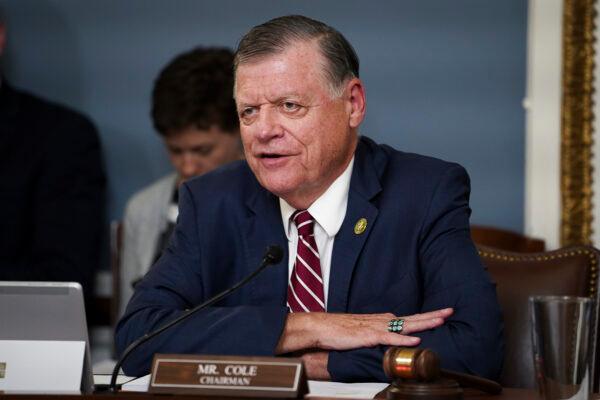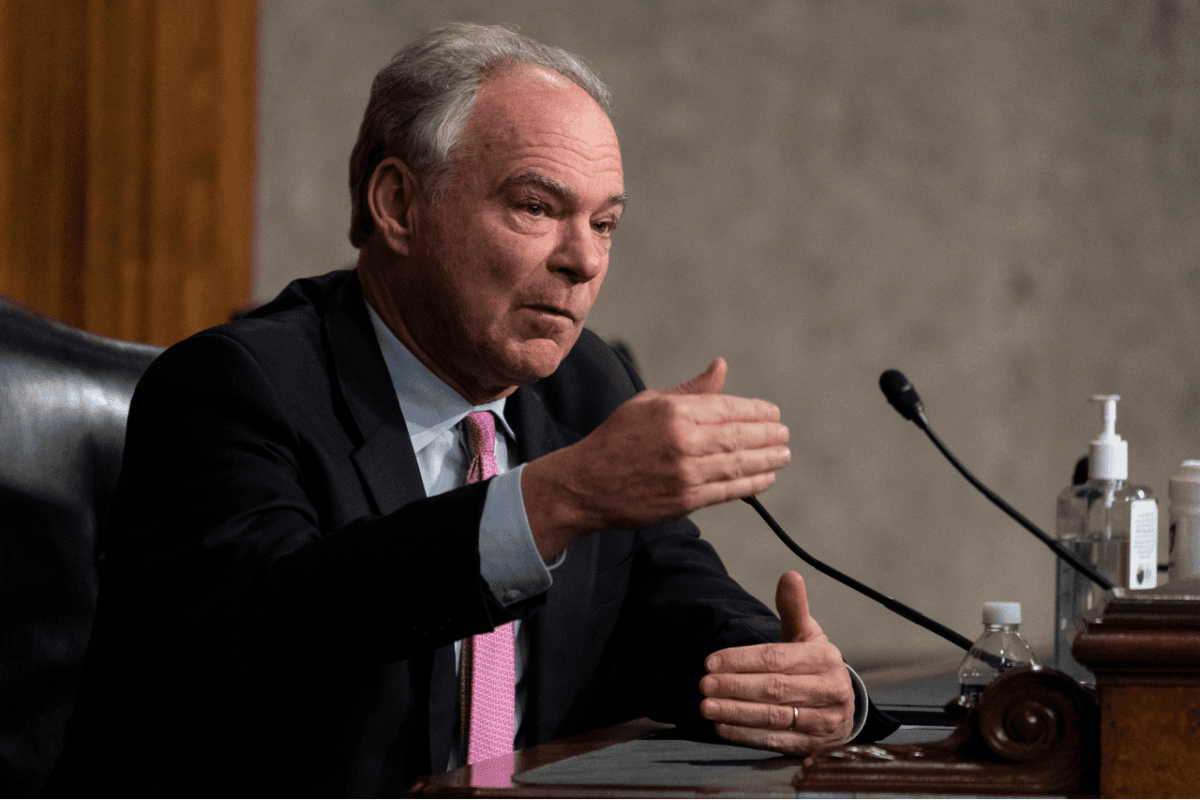Several of the contests will almost certainly affect the composition of the 119th Congress.
Primary contests were held in several states on June 18, with most national attention turning toward Virginia.
In the Old Dominion State, House Freedom Caucus Chairman Bob Good (R-Va.) is in the political fight of his life against state Sen. John McGuire.
The night finished with the race still too close to call.
Other primary races were held in Georgia and Oklahoma, though these races presented few surprises.
Several of these contests will almost certainly affect the composition of the 119th Congress.
Here are the top five takeaways of the night.
Freedom Caucus Chairman Likely Headed for Recount
The most dramatic race of the night, and one of the nation’s most-watched primaries, came in Virginia’s 5th Congressional District battle between Mr. Good and Mr. McGuire.
Because of how close the race is, it’s likely that it’s headed for a recount.
Mr. McGuire received the endorsements of both former House Speaker Kevin McCarthy (R-Calif.) and former President Donald Trump, who snubbed Mr. Good after the latter endorsed Florida Gov. Ron DeSantis early in the presidential primary.
With most of the votes in, Mr. McGuire is leading Mr. Good by a 0.6 percent margin: Mr. McGuire has 50.3 percent of the vote to Mr. Good’s 49.7 percent.
That comes out to a difference of just 327 votes out of the approximately 62,500 cast.
Under Virginia state law, any candidate who loses a race by less than 1 percent of the vote is eligible to request a recount, which the second-place-getter is likely to pursue.
Meanwhile, over at his watch party, Mr. McGuire declared victory despite most forecasters presenting the race as still too close to call.
“The entire DC Swamp was aligned against us with over $10 million in attack ads, but with your help we were able to make this race too close to call,” Mr. Good said.
He expressed hope that early and mail-in votes coming in could bolster his total and vowed that his campaign would “ensure we have teams of observers and legal counsel to ensure all the votes are properly counted in the coming days.”
Tom Cole Easily Survives Challenge
Meanwhile, a bid to replace an established incumbent failed in Oklahoma—and that race was far from too close to call.
There, in the state’s 4th Congressional District, House Appropriations Committee Chairman Tom Cole (R-Okla.) easily fended off a primary challenge from his right.
While four other Republicans were vying to replace Mr. Cole, only one—Paul Bondar—managed to win more than 10 percent of the vote.
With all votes counted, Mr. Cole raked in 64.6 percent of the vote to Mr. Bondar’s 25.8 percent. The Associated Press projected that Mr. Cole had won the race around half an hour after polls closed.
Neither candidate has released a statement on the outcome.
With his victory, Mr. Cole is practically guaranteed to win reelection in the ruby-red district.
The National Republican Congressional Committee (NRCC) issued a congratulatory statement on Tuesday night following Mr. Cole’s sweeping victory.
“There is no one better suited to fight for this district than Congressman Cole,” NRCC spokeswoman Delanie Bomar said in a release. “We are confident the voters will re-elect Tom to Congress this November.”

Along with his long track record in Washington, Mr. Cole raked in numerous endorsements ahead of the primary contest—most notably that of former President Trump, who endorsed Mr. Cole in May.
Hung Cao Wins Virginia Senate Nomination
In Virginia, Republicans elected Navy veteran Hung Cao as their standard-bearer to take on Sen. Tim Kaine (D-Va.) in November.
The Associated Press called the race for Mr. Cao shortly after polls closed in Virginia.
Mr. Cao, who earned an endorsement from former President Donald Trump, defeated four other Republican candidates: Jonathan Emord, Eddie Garcia, Scott Parkinson, and Chuck Smith.
Mr. Cao’s victory sets the stage for a November showdown with Mr. Kaine, a relatively popular incumbent who’s best known to most Americans as former Secretary of State Hillary Clinton’s 2016 running mate.

The political arithmetic represents an uphill battle for Mr. Cao.
Mr. Kaine is a political powerhouse in the Old Dominion State, where he won his most recent election in 2018 by roughly 16 points.
Virginians last sent a Republican to the upper chamber in 2002. The last statewide vote to send a Republican to federal office came in 2004 when Virginians voted to reelect President George W. Bush.
But there are some encouraging signs for Republicans in the state.
In the two most recent polls taken in the presidential contest, conducted by Fox News and Roanoke College, former President Trump and President Joe Biden were locked in a dead heat.
Earlier polling looked at a hypothetical match-up between Gov. Glenn Youngkin and Mr. Kaine.
In those polls, Mr. Kaine led by between 2 and 5 points—which doesn’t bode well for Mr. Cao, who doesn’t have nearly the same statewide profile as Mr. Youngkin.

In a late April poll, pollsters asked voters who they’d choose in a hypothetical matchup between Mr. Kaine and Mr. Cao. In that poll, Mr. Kaine led by 12 points.
Still, with polls showing that Republicans are on track for a better performance in Virginia than they’ve seen in years, the seat remains a target for Senate Republicans.
Democrats Set to Defend 2 Seats
Democrats are hoping to retain two seats in the House in two Virginia swing districts with open seats.
The first of these, Virginia’s 7th Congressional District, is being vacated next year by Rep. Abigail Spanberger (D-Va.), who’s running for governor of Virginia.
In Virginia’s 10th Congressional District, Rep. Jennifer Wexton (D-Va.) plans on retiring later this year after she received a debilitating diagnosis with a Parkinson’s-like condition.
These retirements leave the seats—both of which are in the suburbs of Washington, D.C.—open.
As northern Virginia has increasingly trended left over the past two decades, they are two seats that Democrats still have a slight edge to win.
Nevertheless, both seats are top targets for Republicans and House Speaker Mike Johnson (R-La.) as they seek to hold and expand their House majority.
In the 7th Congressional District, Republicans elected to nominate 39-year-old Army veteran Derrick Anderson. Democrats nominated Eugene Vindman, a former ethics lawyer at the National Security Council.
The 7th congressional district, a crucial battleground and one of the most diverse districts in the Commonwealth after a redistricting in 2021, stretches from northern to central Virginia and spans over 10 counties and Fredericksburg, an independent city.
Ms. Spanberger’s first-term victory of less than two points in 2018 in the old 7th district ended a half-century Republican streak. Two years later, she defended her seat by less than two points again. She won her third term in the new 7th district by less than five points in 2022.
In the 10th Congressional District, voters chose Mike Clancy by a wide margin, winning 64.3 percent of the vote to the next closest rival’s 21.5 percent.
Democrats meanwhile chose state Sen. Suhas Subramanyam to seek to hold Ms. Wexton’s seat.
Mr. Subramanyam defeated a crowded field of a full dozen candidates, winning 30.4 percent of the vote to his closest competitor’s 26.7 percent.
The district is an ancestrally Republican one. Until Ms. Wexton’s victory during the 2018 blue wave, the seat hadn’t voted for a Democrat since it was established.
Still, shifting demographics in northern Virginia as a whole could make it difficult for Republicans to reclaim the seat this year.














